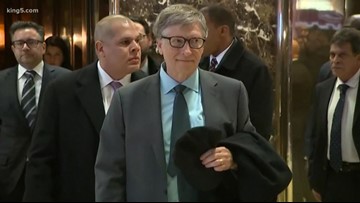Bill Gates is starting a new fight against systemic poverty in America, as his private foundation announces millions of dollars toward unspecified initiatives ranging from data projects to funding for community activists.
The Bill and Melinda Gates Foundation said Thursday that it will spend $158 million on the issue over the next four years. Specific programs and grants haven't been identified but Gates' new U.S. work will be informed by the U.S. Partnership on Mobility from Poverty.
The world's largest philanthropy funded the ideas-oriented task force to kick-start its entry into American poverty issues. The partnership is housed within the Urban Institute, a liberal-leaning, DC-based policy think tank. The group said its work over the past two years was to create ideas that philanthropy, businesses and government could carry into action.
Members of the committee have issued proposals as broad as "confront racism" in neighborhood planning, and as specific as urging for an expansion on the child tax credit and housing assistance voucher eligibility to help families with children under 6 years old. In addressing the income gap, they advocate for better jobs and more workers' rights through wage subsidies, community college access and a gig-economy benefits system, among other concepts.
How Gates' money will make it all happen is unclear but the foundation going forward is expected to fund pilot projects and research that will help support such ideas. The foundation CEO Sue Desmond-Hellmann said data and analysis are needed in order to root out possible answers at the core of the issue but also acknowledged that studying the problem would be the easy part of this tall order.
"It's easier to generate data than it is to make an impact," Desmond-Hellmann said.
The foundation has lately been turning its attention to U.S. poverty, with the Microsoft co-founder discussing publicly a trip to Atlanta last year as a "searing portrait of American poverty."
Since 2000, the Seattle-based private foundation with its endowment worth over $40 billion has largely focused on global health and development. In the U.S., it has set its sights on reshaping American schools, making itself the largest funder of U.S. schools reform, though critics have long challenged Gates to do more to help the poor at home in America.
Desmond-Hellmann said its new strategy on poverty issues will complement its existing education work.
In an interview this year with The Associated Press, the Gateses talked about broadening their agenda to look at other problems that hinder children in the classroom.
"Poverty is like education, where there's not enough philanthropic resources to take on responsibility, but if you can show how to have a lot more impact, then the policies will benefit from that," Bill Gates said.

No comments:
Post a Comment